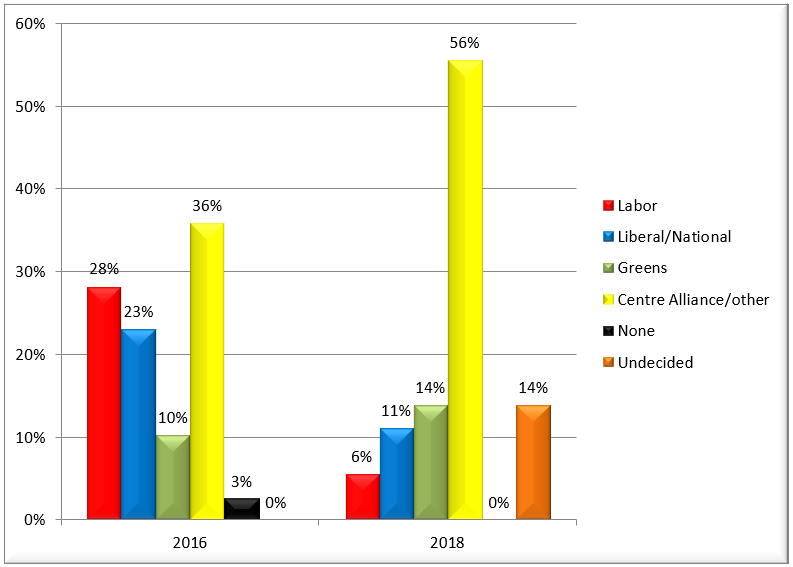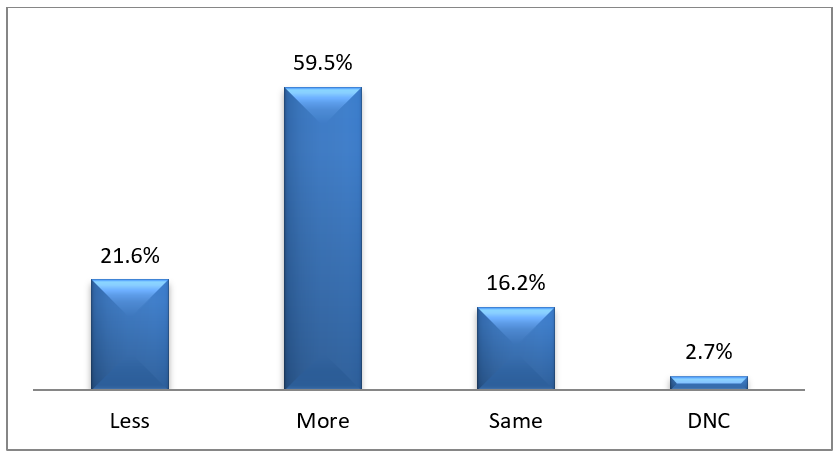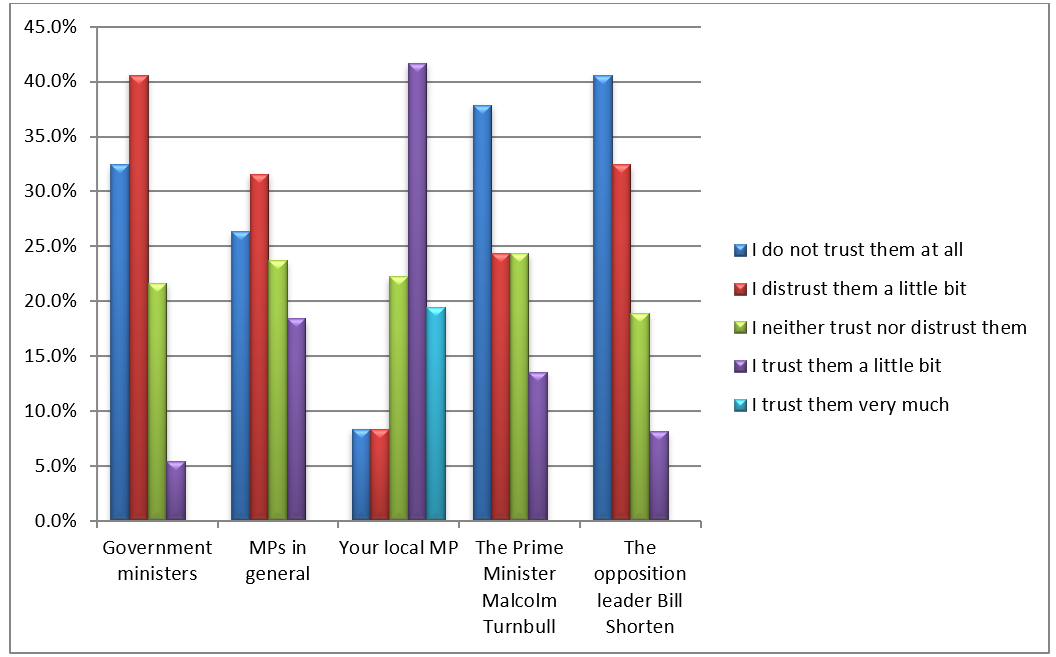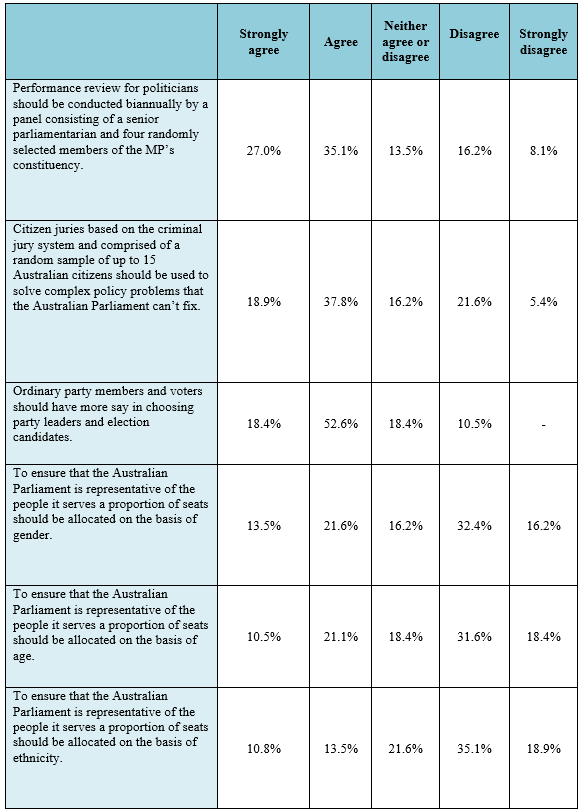A Tale of Two Mayos: Community Perspectives on the 2018 Mayo By-election

This article reports the findings from four focus groups conducted in the Mayo electorate between 17-18 July 2018, 10 days prior to the Super Saturday By-election. The report is organized around four sets of questions regarding: 1) policy and political contexts; 2) citizen perspectives on the candidates; 3) community values (trust and democracy); and 4), community attitudes towards democratic reform.
The focus groups were organized around four cohorts:
- the 65 plus age group (Focus Group 1);
- the 35 to 65 age group (Focus Groups 2 and 3); and,
- the 18-35 age group (Focus Group 4).
We deliberately recruited participants who do not align with a particular political party or are rethinking their political position; so called “soft” voters. Given that this group now represents 70 per cent of the Australian electorate it should provide us with a strong measure of changes in local constituency opinion since 2016 and whether the independent incumbent will hold on.[1]
1. CONTEXT
Policy problems
We asked Focus Group participants whether they felt South Australia was heading in the right or wrong direction. 48.6 per cent felt that South Australia is heading in the right direction and 45.9 per cent felt that South Australia is heading in the wrong direction. Those that felt that South Australia is heading in the right direction tended to focus on Adelaide CBD and general improvements in City infrastructure. Others noted that this is not the case in rural and regional South Australia. Here there is a strong perception that basic services have disintegrated (particularly transport and community health) and basic infrastructure is failing: “development stops at Gepps Cross”.[2]
Significant concerns were exhibited over economic development issues and the failure of federal and state governments to deal with big public policy problems such as energy and the Murray Darling Basin Plan.
The key policy problems highlighted by participants included: economic development (lack of growth), electricity, energy policy in general (as highlighted by the Tesla battery deal), the Murray Darling Basin Plan and the health of the mouth of the River Murray.
Politics
We asked Focus Group participants which way they voted in the last election and why. See Figure 1.

Figure 1. Mayo community voting preferences 2016 and 2018
Rebekha Sharkie’s victory in 2016 was largely attributed to:
- a protest vote against the Liberal Party because of the behaviour of Jamie Briggs.
- Disdain for career politicians.
- Perceptions that Mayo was “struck in a rut” and “needed a fresh start”.
- Sharkie’s “community mindedness”, personal qualities such as “integrity”, “approachability”, “visibility”, and “passion for local issues”.
- And remarkably the belief that Mayo will get more from Canberra with an independent MP i.e. A vote for Sharkie is a tactical vote:
“Jamie Briggs was an icon for the new political class. He had no career outside politics. He was trained up as a political staffer and we just didn’t want someone like that. We are sick of that type of politician”.
A general sense of powerlessness within the Federation is perceived:
“We are a small state with a small population that is rarely taken seriously in federal politics”.
In terms of participant perceptions of party leaders, Malcolm Turnbull continues to disappoint, although the odd participant thought he was improving
“His whole response to Abbott made him look very weak.”
“I was so excited when he became leader because he’s such a compassionate man. But now I’m really disappointed in him. He doesn’t stand up for what he believes in.”
Bill Shorten is also perceived to be performing badly and is viewed in a similar way to Tony Abbott as a “negative politician” or “spoiler”:
“Hopeless; all he can do is wreck; like Abbott.”
2. THE CANDIDATES
Mayo is a particularly interesting seat because it is a David and Goliath contest between the incumbent Centre Alliance candidate Rebekha Sharkie and Georgina Downer the daughter of former Liberal Party leader Alexander Downer. It is noteworthy that participants thought that the recently announced boundary changes released by the Australian Electoral Commission on 13 April would apply in the by-election. This is not the case. At the next Federal Election Mayo will encompass the Adelaide Hills, Fleurieu Peninsula and Kangaroo Island seat, with the addition of areas around Aldinga from Kingston.[3]
Nonetheless participants did say that Mayo now has a younger local population with a large number of young families and high expectations for active representation.
We asked Focus Group participants how they were likely to vote in a week’s time. See Figure 1. On the basis of this sample: Sharkie is strengthening her grip on the seat; the Liberal-Nationals are struggling; Labor has collapsed; and the Greens under Major Sumner are making gains.
Sharkie and Downer are perceived to represent two very different Mayos. Downer represents old "blue ribbon" Mayo (as did the disgraced Jamie Briggs) home to the Adelaide elite and Sharkie represents new Mayo which is associated with changing community demographics which include households from a much broader range of income groups including young families who are looking for active community minded representation.
We asked Focus Group participants their views on the candidates.
Dual citizenship isn't perceived to be a problem for Sharkie (and in general). Not one participant criticized Sharkie for the by-election.
The general view is that Sharkie has performed very well as an incumbent – she “engages”, “cares”, is highly “visible” and “approachable” (there are strong parallels here with Cathy McGowan, MP for Indi):
"She is present; Downer is absent. It's as simple as that."
In terms of preferences – on the basis of 39 independent voters, Sharkie should improve her position. All of the Labor voters last time are moving to either her or the Green candidate (Sumner). And half the Liberal voters are moving to her. On the basis of this tiny sample Labor is collapsing and Shorten is performing very badly across all cohorts particularly amongst former Labor voters. Sharkie’s supporters believe that her independence from party is an absolute virtue.
“I like her because she’s not associated with the big parties and she’s local and cares.”
Most participants believe that political parties (even those aligned) were disconnected from their communities. And they liked Sharkey because she is is rooted in the Mayo community:
"She bleeds Mayo".
"She is passionate about Mayo and it shows".
“She doesn’t do negative politics; unlike Georgina”.
“She works, acts and lives in Mayo and has Mayo in her heart”.
This is in contrast to Downer who is viewed to be an outsider. Many participants had personal stories to tell about her from primary school onwards. Not one Focus Group participant argued in support of Downer. “I don’t want to be unkind, but she was pretty well universally disliked” – "privileged", "entitled", "snobby", "stuck up". In contrast to her father who was treated respectfully and was viewed to be “Mayo through and through”. One participant did emphasize that Downer was “highly intelligent and driven”.
Downer appears to have made a number of poor political decisions (though they need verification):
- accused Adelaide of being the gun capital of Australia and said she wouldn't live there.
- Deleted harmless questions from constituents from her Facebook page.
- Held a $5,000 per person gala dinner as opposed to Sharkey who held a quiz night or similar.
These perceptions reinforce the two Mayos narrative.
In contrast, the Greens are perceived to be moving forward with candidate Major Sumner who is very well thought of by those that are driven by concern with environmental issues although they don’t think that "he really stands a chance of winning".
In sum, the evidence from focus group discussions strongly suggest that Sharkie will hold on; yet another triumph for independent candidates at the expense of party machines.
3. VALUES
We asked Focus Group participants whether they felt that they were becoming more or less extreme in their views as they got older. This was to test the thesis that declining trust is leading to a more assertive, questioning citizenry. See Figure 2.

Figure 2. Do you think that your views are becoming more extreme as you get older?
Remarkably 59.5 per cent of participants believe that they have become more extreme in their views as they have got older; 21.6 percent less. Please note that participants’ equated extreme views with "passion about their politics", "clear views on how things need to improve”, and, “expectations of MPs and how they should behave”:
“I’ve become more passionate. I’m seeking knowledge more.”
“Less deferential to political parties”.
We also found a strong link between declining trust and support for community focused independents. It is also evident that there is mounting support for changing Australia's model of democracy through a mixture of reforms that both hold politicians to account to local electorates and enhance citizen participation in policy design and delivery.
We asked Focus Group participants about the degree of trust they had in different political figures. See Figure 3.
There is strong evidence here of support for conviction politicians and politics. Turnbull is viewed to be performing better but is still perceived to be lacking conviction; Shorten is purely viewed as a “negative politician” or “spoiler”.
There is deep disdain for the behaviour of federal politicians and “adversarial politics” (this phrase was used a lot) – appalled by the David Leyonhjelm affair – very vocal in wanting cross partisanship on key issues particularly in relation to energy, growth and the environment.
There is a general lack of trust in political figures, except for Sharkie; and a particular lack of trust in government ministers and Bill Shorten.

Figure 3. How much do you trust…
We asked Focus Group participants about their general views on the health of Australian democracy. Nobody believed that there was an alternative. All participants believe that democracy is “the only game in town” but that we need a "new model of democracy" . As one participant put it:
"Our democracy needs to be fine-tuned".
In discussions it emerged that this new model of democracy is partly about ways of holding politicians to greater account but also about getting a better balance between localism and national politics.
Notably, the vast majority (91.7 per cent) believe that "politicians don't care about people like them".
4. REFORM
We explored a variety of reforms for both enhancing citizen participation and holding MPs to account. These reforms were described in detail to the participants. See Appendix 1. In general there is very strong support for:
- the co-design of public services with citizens (92 per cent);
- free votes in parliament (86.5 per cent); and,
- internal party democracy to ensure greater representativeness in parliament and more localism (71 per cent).
There is strong support for:
- dual citizen parliamentarians (55.6 per cent);
- performance review for MPs (62 per cent);
- the use of citizen juries (57 per cent); and,
- postal voting (54 per cent), although an expectation for on-line delivery:
“Why was the postal vote not done on-line? It would have saved so much money.”
It is also worth noting that non retirees were stronger supporters of performance review for politicians (70 per cent), postal voting (60 per cent) and citizen juries (90 per cent) but retirees were less convinced on these issues. Retirees were more supportive of co-design (100 per cent), and free votes in parliament for MPs (100 per cent). In overview, the younger cohort was more reform minded but all cohorts embraced certain aspects of reform. A mixture of accountability and participatory reforms were supported.
In conclusion: the rise of an assertive democratic culture?
It remains to be seen whether the sentiments expressed in our focus groups will manifest themselves in an increased majority for Rebekha Sharkie but it is becoming increasingly evident that lack of political trust is driving a citizen-led demand for greater local accountability and community-minded representation. Unless the major political parties adapt to this realpolitik this is a snowball that might well become an avalanche.
[1] Evans, M., Halupka, M. and Stoker, G. (2017), How Australians Imagine their Democracy: the Power of Us, Canberra, IGPA/MoAD. Available on-line at: /magma/media/upload/publication/408_Democracy100-report-IGPA.pdf (retrieved 19 July 2018), p.14.
[2] Please note that this and other quotations presented in this article are extracted from our four focus group discussions.
[3] See: http://www.abc.net.au/news/elections/federal-redistribution-2018/sa/, retrieved 19 July 2018.
Appendix 1. Perceptions of different ways of building trust between government and citizen

.png)

